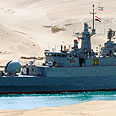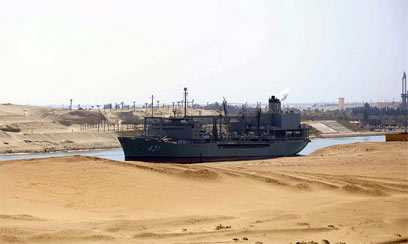
Iranian ship in Suez Canal
צילום: רויטרס
Iranian naval vessels sail through Suez Canal
Frigate, supply vessel pay $300,000 in fees for passage; reach Mediterranean Sea at 4 pm en route to Syria. Iran's deputy army commander says Israel astonished'
Two Iranian naval ships passed through Egypt's Suez Canal into the Mediterranean on Tuesday heading for Syria, a source at the canal authority said, a move that Israel condemned as a "provocation".
Iran appears to be testing the state of affairs in the Middle East after the fall of Egyptian President Hosni Mubarak. A longstanding peace treaty with Egypt is crucial to Israel's regional security.
Washington said it was monitoring the ships' movement.
The ships entered the canal at 5: 45 am (0345 GMT) on Tuesday and passed into the Mediterranean at 3: 30 pm (1330 GMT), the Suez Canal Authority source told Reuters. "Their return is expected to be on March 3," the source said.
The Suez Canal cuts through Egypt and allows shipping to pass from the Middle East to Europe and vice versa without going around the southern tip of Africa.
The canal's northern mouth, Port Said, is around 100 km (60 miles) from Israel, but the ships' route would take them into the Mediterranean along Gaza and the Israeli coast. The vessels, the first Iranian navy ships to enter the canal since Iran's 1979 Islamic revolution, are a frigate and a supply ship.
Israel is anxious about political upheaval in Egypt and other Arab states aligned with its ally the United States. Prime Minister Benjamin Netanyahu had previously said he would take a "grave view" of the passage of Iranian naval ships.
Deputy Israeli Prime Minister Moshe Yaalon told Israel's Channel 2 television on Tuesday: "It's an Iranian provocation. When you look at the Middle East, wherever the Iranians weigh in, the situation is not good."
He added: "It certainly does not bode well, but these two ships are not an immediate threat against us."
Israeli media have quoted unnamed navy officials as saying the Iranian vessels would be tracked, but not confronted.

Iranian ship in Suez Canal, Tuesday (Photo: AFP)
US State Department spokesman P.J. Crowley said: "We the United States have for a long time supported freedom of navigation, so the decision to allow them to transit the Canal is a decision between Iran and Egypt."
"Obviously we have concerns about Iran's behavior in the region, we'll be watching carefully," he said.
Iran's deputy commander of the army, Abdolrahim Mousavi, was quoted by the official Irna news agency on Tuesday as saying that Israel was "astonished" by the presence of Iranian naval vessels in the canal.
Using a term by which Iran refers to the United States, he added: "The global arrogance must know that the Islamic Republic of Iran's army is fully prepared to defend its goals.
"The world should know that the presence of Iranian warships in the Suez Canal has taken place ... through the deep guidance of the Supreme Leader (Ayatollah Ali Khamenei) and our young and brave personnel's self-confidence."
A recently completed Israeli war game, the first since Mubarak quit Egypt's presidency, concluded it would boost military preparations but try to avoid confrontation unless it sees a greater threat from Iran.
Egypt's ruling military council, facing its first diplomatic headache since taking power on Feb. 11, approved the Iranian vessels' passage through the canal, a vital global trading route and major source of revenue for the Egyptian authorities.
The decision was difficult for Egypt's interim government. Cairo is an ally of the United States while its relations with Iran have been strained for more than three decades.
Analysts say Iran sees itself benefiting from the upheaval across the Middle East. Dislodgement and weakening of leaders sympathetic to the United States are likely to embolden Tehran, and lessen the chances of it making concessions on its nuclear program. Iran denies it intends to build atomic weapons.
- Follow Ynetnews on Facebook










